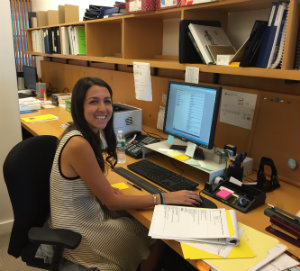 Avital Benson, a senior at the University of Pennsylvania School of Nursing, worked as a 2015 summer intern at The John A. Hartford Foundation.
Avital Benson, a senior at the University of Pennsylvania School of Nursing, worked as a 2015 summer intern at The John A. Hartford Foundation.The first vivid memory that I have is of carrying aluminum foil containers of food up to a large white house in New Jersey. Although I have always had this memory of delivering Meals on Wheels with my mom, I never realized how young I was (2 ½ years old) until I was reminiscing about it recently.
I was telling my mom about how Meals on Wheels often comes up in conversation at The John A. Hartford Foundation as an example of a program that’s a necessity for older adults who are homebound, and I mentioned my memory of helping her deliver meals. Stunned that I still remembered, she looked at me and said that memory had stayed with me for a reason. And she was right.
I have found my passion (one that I always had, but needed assistance in realizing) at The John A. Hartford Foundation during the summer internship I just completed here. Since the time I was 2 ½ years old, I have had an inkling, a calling, to care for older adults.
As a nursing major, that calling began to stir during my medical-surgical rotation last semester, as I witnessed the resilience that older adults exhibit on a daily basis in the hospital. I watched as a 60-year-old patient with stage IV pancreatic cancer went through paracentesis every single day because he was determined to make it to his son’s play at school. I listened to an 87-year-old man call his wife of 60 years to tell her that he was feeling great and would come home soon, just to make her happy (even though he had struggled to simply sit up in bed just five minutes earlier). I held the hands of a 75-year-old stroke patient who was trying to teach herself how to speak again with no assistance.
These moments made working with older adults feel so special. Older adults are the ones who will tell you the story of how they met their spouse years ago, and the ones who will tell you why you shouldn’t get married at all. They are the ones who will explain that sugar is bad for you, but that life is too short to go without it. They are knowledgeable and full of a lifetime of experiences, celebrations, and let-downs.
Sadly, I also observed that the care they often received wasn’t up to par with the patient’s goals of care, which motivated me to work harder. Like when my 80-year-old patient, who was transferred from a nursing home, just wanted to return to his wife, but the hospital was shipping him off someplace else upon discharge. Or when a 70-year-old man hadn’t been washed in three days since he was in the ICU and I, the nursing student, was the first person to notice.
These things happen, but they shouldn’t. And it is our responsibility to stop them.
Older adults need specific, delicate, geriatric care. As a nursing student, I was able to administer medications, change bed linens, and set up IV lines with the supervision of my instructor. I could double check each patient’s chart to make sure he or she was moving every hour, getting bathed once a day, and had a fall risk bracelet on. But I am only one person and it never occurred to me that efforts to improve care for older adults could come from outside the hospital setting.
Now, after interning at The John A. Hartford Foundation, I understand the larger pieces that affect the care of older adults. I have been exposed to what foundations, policymakers, non-profit organizations, and others do from afar that is necessary in order for physicians, home care aides, pharmacists, nurses, social workers and others who provide care to help elderly patients in the ways that they should.
It has been amazing to watch as The John A. Hartford Foundation leads by example. It already has provided grants to universities to improve education on geriatric care; to medical students creating a program for home health care for older adults; to social workers to improve services delivered to older adults; and to researchers who compare health outcomes of older adults with multiple chronic conditions, among many other significant initiatives.
I have watched the passionate staff advocate for the health and the rights of older adults, and I leave my summer internship with a sense of relief in knowing that The John A. Hartford Foundation is a leader in a vibrant aging and health field dedicated to improving the care of older adults in our country.
I also leave with the motivation to encourage myself and my peers to follow the exhortation of the Foundation’s benefactors, John A. and George L. Hartford, and “strive always to do the greatest good for the greatest number.”
